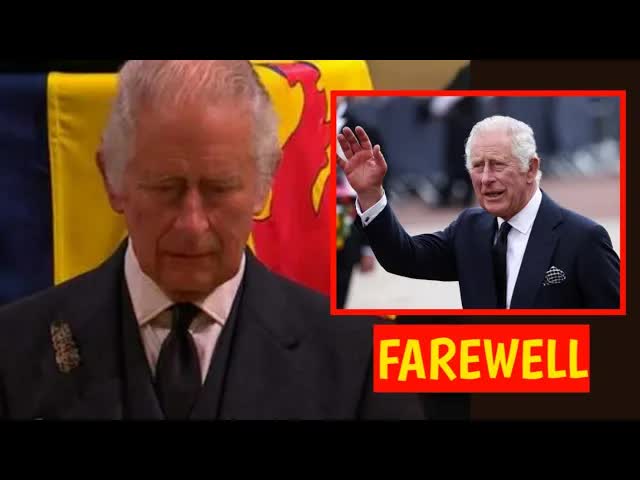Must Read
King Charles III: A Monarch at a Crossroads
A gripping narrative is unfolding within the British royal family as King Charles III grapples with intense public scrutiny and personal challenges.
Recently ascending to the throne, Charles is now facing a potential health crisis that looms over his upcoming tour of Australia and Samoa.
The question on everyone's lips: Is abdication on the horizon for the new king?
With concerns about his health mounting, many wonder if he will be able to complete his reign.
Royal tours have long been a cornerstone of the British monarchy, serving to reinforce international relationships and showcase the historical legacy of the crown.
Queen Elizabeth II was renowned for her extensive travels, and King Charles' forthcoming journey is intended to uphold this tradition.
However, the shadow of his health issues casts doubt over the significance of this trip.
At 75, Charles is reportedly dealing with various health concerns, prompting him to travel with two doctors and even his own blood supply—an unusual measure that raises eyebrows about the state of his well-being.
The mere mention of abdication sends shivers down the spines of royalists everywhere, as the British monarchy is traditionally anchored in lifelong service.
The last significant abdication discussion occurred in 1936 when King Edward VIII stepped down.
For King Charles, the contemplation of such a decision intertwines with his sense of duty and personal health.
As the challenges of kingship mount, whispers of his possible resignation have started circulating within palace walls, leaving many to ponder whether he will follow in his mother's footsteps or choose a different path.
Charles has always projected an image of strength and commitment to his role, yet recent public appearances have revealed signs of weariness.
Reports from insiders suggest that the king's health is more precarious than previously believed, particularly with the demands of his upcoming tour.
Australia and Samoa are bustling nations that will require him to be active and engaged, raising concerns that this trip could be one of his most challenging undertakings yet.
Beyond the physical strain, the emotional burden on King Charles cannot be overlooked.
He has long embraced his responsibilities, but now finds himself at a pivotal juncture.
The weight of his choices is evident, as he grapples with feelings of vulnerability and uncertainty about his future.
Friends close to him have noted that he has been emotionally affected by the prospect of stepping down, a notion that seems to conflict with his lifelong dedication to the monarchy.
Supporting him through this tumultuous time is Camilla, the queen consort.
As his closest ally, she has consistently stood by his side, offering guidance as he navigates these difficult decisions.
While Camilla is not pushing for abdication, she encourages Charles to prioritize his health and consider the implications of his choices.
If he were to step back, her role would become increasingly significant in managing the transition, a bittersweet prospect given the toll the monarchy has taken on her husband.
Should Charles choose to abdicate, the monarchy would likely experience profound changes.
Abdication is a rare event that has historically posed challenges, yet public sentiment has shifted over time.
If Prince William were to ascend the throne, his modern approach and popularity could breathe new life into the institution.
Many believe that he is well-prepared for kingship, but the implications of an early abdication raise questions about the monarchy's future trajectory.
Reflecting on King Charles' legacy, a potential abdication would prompt discussions about his contributions and impact.
His reign, though brief, has already left a mark, particularly regarding environmental advocacy and fostering unity within the Commonwealth.
Choosing to step down could symbolize his commitment to the monarchy's longevity over personal pride, a selfless act that might fortify its future.
This situation resonates deeply with the public, who have followed Charles throughout his life.
After years of anticipation for his reign following Queen Elizabeth II's long tenure, the thought of abdication introduces uncertainty.
Many supporters feel that he still has much to offer, and a resignation could trigger movements toward republicanism in countries like Australia and Canada, fundamentally altering political landscapes.
Australia's perspective on the monarchy has been under scrutiny, especially in light of recent events.
The debate surrounding ties to the crown has intensified since the Queen's passing, and if Charles were to abdicate during or after his tour, it could invigorate calls for a republic.
Such a shift would challenge the monarchy's relevance in a modern context, particularly as sentiments grow for a head of state that reflects the Australian populace rather than a distant monarch.
While Australia garners significant attention, King Charles' visit to Samoa is equally vital.
As a member of the Commonwealth, Samoa represents the importance of small nations within the royal framework.
This visit reflects Charles' vision for a united Commonwealth, showcasing support for these nations amidst changing political tides.
However, the backdrop of his health concerns complicates this engagement, making it a moment of both admiration and apprehension for the king's future.
If Charles does decide to abdicate, Prince William stands ready to step into the spotlight.
Having prepared for this role throughout his life, William's ascension could usher in a new era for the monarchy.
His modern approach resonates with younger generations, and while he would face challenges in balancing tradition with innovation, many believe he possesses the qualities needed to lead effectively.
King Charles' impending decision will undoubtedly serve as a watershed moment for the monarchy.
His reign, whether it concludes soon or extends further, will leave an indelible mark on the institution.
By prioritizing his health and the monarchy's future, Charles may redefine what it means to be a monarch in contemporary society, paving the way for a more adaptable royal family in the years to come.




































